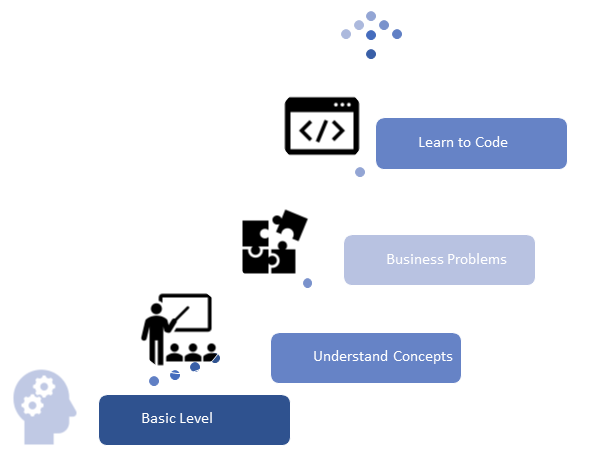Foundational Data Science Training

Learn the most fundamental and in-demand skills to land up with a career in the field of data science. A comprehensive and well-structured live instructor led training to help you understand foundational concepts in data science with real industry applications and hands on coding in Python.
Pre-Requisites for Joining Data Science Training
This is a foundational course, and doesn't require any expert knowledge or expertise. However, the following are important to have as this is an online course.
- Candidate should have a good and stable internet connection
- No background in statistics or programming is required
- MS Windows preferred (if not please inform)
- Mode of teaching: English
Course Structure of Data Science Training
The course has been split into strategically well-structured modules to help learners understand the most fundamental concepts in a step-by-step easy to follow manner. The course aims to help the learner.

Syllabus of Foundational Data Science Training
Module 1 – Overview of Analytics
- A Beginners Introduction to Analytics
- Case Study
- Basic principles in marketing
- Industry applications
- Categories of analytical capabilities
- Scope of Analytics
- Tools and Technologies
Module 2 – Data Understanding
- Data and its types
- How to measure data in different ways
- Pattern finding with Data interpretation
- Data visualization
- Basic Statistics
- Exploratory data analysis techniques
- The art of storytelling
- Applications – Exploratory Data Analysis for a real industry application
Module 3 – Basic Statistics for Data Science
- Probability Concepts
- Sampling Techniques
- Estimation Techniques
- Statistical Inference
- Statistical Measures
Module 4 – Concepts in Machine Learning
- Overview of Machine Learning
- Supervised Learning vs Unsupervised Learning
- Regression Techniques
- Classification Techniques
- Introduction to Clustering
Module 5 – Programming with Python – Part 1
- Installation and overview of Python
- Data types in python
- Packages and modules
- NumPy
- Pandas
- Data Manipulation in Python
- Data Visualization in Python
Module 6 – Programming with Python – Part 2
- Perform Regression in Python
- Perform Classification in Python
- Applications –real industry application
Data Science Course Trajectory
Overview of Analytics
This section aims at introducing the field of analytics and data science with different real world industry applications. You will be more familiar with the different terminologies and be able to relate to the approaches in the course from real life examples you see every day around you.
Understanding Data related concepts
In this part of the course, you will be developing the right problem-solving acumen and try to identify patterns and insights from chunks of data. You will learn how to extract meaningful insights from your data and present the findings.
Basic Statistics for Data Science
Once you have gained familiarity with generating basic insights from the data, in this part, you will be able to apply statistical concepts to be able to generalize your findings from data. You will learn the art and math of the different ways to perform business use case analysis through tools and techniques essential for any data scientist.
Concepts in Machine Learning
In this part of the course, you will take a step further and be able to connect all that you have learned so far and develop statistical and mathematical models to solve problems. You will learn the math and science behind some of the most commonly used statistical techniques that are critical to know if you are planning to switch to a career in data science.
Programming with Python
To further build your confidence on the topics you have learnt above, in this part, you will perform hands-on coding with the most sought-after programming language and come a step closer to your dream job.
Assignments & Discussions
The entire course will have periodic assignments you would need to solve. In this bonus part, you will also receive assistance in terms of discussions to test your understanding, guidance, special tips and tricks to ace your upcoming data science interviews.
Are You Not Sure if You Need to Join 3S IT?
Book a Demo Class Now & Decide for Yourself.
Data Science Course Schedule
| Week | Topic | Learning Outcomes |
| Week 1 | Module 1 - Overview of Analytics | After end of this module, you will be able to have a good understanding of the field of analytics and identify opportunities |
| Week 2 | Module 2 - Understanding Data related concepts | After end of this module, you will be able to have a good understanding of data related concepts, how to identify outliers, missing values and find interesting patterns in data |
| Week 3 | Module 3 - Basic Statistics for Data Science | After end of this module, you will be able to apply statistical concepts in solving complex business problems |
| Week 4 | Module 3 - Basic Statistics for Data Science | After end of this module, you will be able to apply statistical concepts in solving complex business problems |
| Week 5 | Module 4 - Concepts in Machine Learning | After end of this module, you will be able to identify and solve business related problems by applying advanced analytical concepts |
| Week 6 | Module 4 – Concepts in Machine Learning | After end of this module, you will be able to identify and solve business related problems by applying advanced analytical concepts |
| Week 7 | Module 5 – Programming with Python – Part 1 | After end of this module, you will learn to apply the concepts learned so far by coding hands-on with thew most in-demand programming language |
| Week 8 | Module 6 – Programming with Python – Part 2 | After end of this module, you will learn to apply the concepts learned so far by coding hands-on with thew most in-demand programming language |
